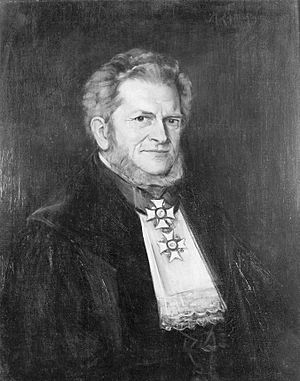Christoph von Sigwart facts for kids
Quick facts for kids
Christoph von Sigwart
|
|
|---|---|

Christoph von Sigwart
|
|
| Born | 28 March 1830 |
| Died | 4 August 1904 (aged 74) Tübingen, Württemberg
|
| Era | 19th-century philosophy |
| Region | Western philosophy |
| School | Psychologism |
|
Main interests
|
Logic, ethics |
|
Influences
|
|
|
Influenced
|
|
Christoph von Sigwart (born March 28, 1830 – died August 4, 1904) was an important German thinker. He was a philosopher, someone who studies big ideas about life and knowledge. He was also a logician, meaning he studied how we think clearly and reason. Christoph was the son of another philosopher, Heinrich Christoph Wilhelm Sigwart.
Contents
Life of Christoph von Sigwart
Christoph von Sigwart studied philosophy and theology. Theology is the study of religious beliefs. In 1859, he became a professor in a town called Blaubeuren. Later, in 1865, he became a professor at the famous University of Tübingen.
Sigwart's Main Philosophical Work
Sigwart's most important book was called Logik, which means Logic. The first part of this book came out in 1873. It quickly became a very important book for people studying logic in the late 1800s.
What was Logik about?
In his book, Sigwart wanted to create a complete theory of logic. He didn't try to compare his ideas with other philosophers' ideas. Instead, he built his own system from the ground up.
Studying Logic from Other Countries
Sigwart spent a lot of time studying the ideas of logicians from different countries. He looked at thinkers from Germany and England. In 1895, his book Logik was translated into English by Helen Dendy. This helped his ideas reach even more people.
Ideas on Induction Theories
One interesting part of his book, especially for English thinkers, was Chapter 5 of the second volume. In this chapter, Sigwart looked closely at different induction theories. Induction is a way of reasoning where you make general rules from specific examples. He discussed the ideas of famous philosophers like Francis Bacon, John Stuart Mill, and David Hume.
Other Writings
Sigwart also wrote a collection of shorter works called Kleine Schriften. In these writings, he shared valuable thoughts about other historical figures. These included thinkers like Paracelsus and Giordano Bruno.
See also
 In Spanish: Christoph Sigwart para niños
In Spanish: Christoph Sigwart para niños
- Psychologism dispute
 | William Lucy |
 | Charles Hayes |
 | Cleveland Robinson |

